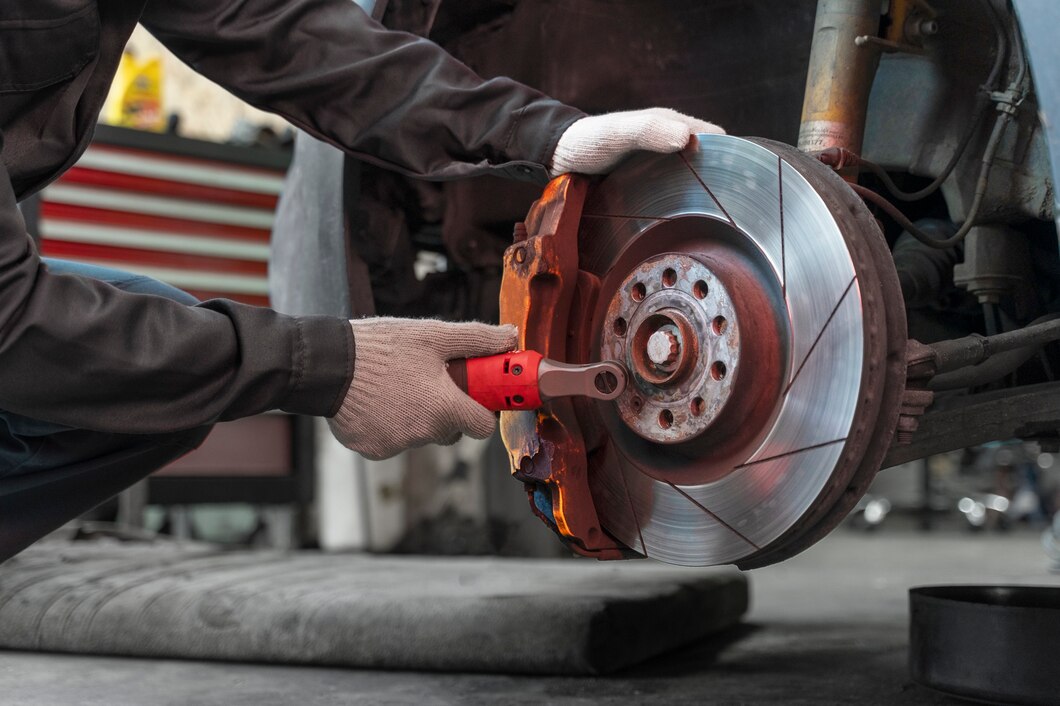Your car’s brakes are its most critical safety feature, responsible for slowing down and stopping your vehicle safely and effectively. Recognizing the early signs of brake wear and deterioration is crucial to maintaining optimal braking performance and ensuring the safety of you and your passengers on the road. Whether you’re a seasoned driver or new to the world of automotive maintenance, understanding the early signs that your car’s brakes need attention is essential. Let’s explore some common indicators that it may be time to have your car’s brakes inspected and serviced:
1. Squealing or Grinding Noise:
One of the most common early warning signs of brake wear is a squealing or grinding noise when applying the brakes. This noise is typically caused by worn brake pads or brake rotors, which may be nearing the end of their service life. Ignoring this noise can lead to further damage to the brake system and compromise braking performance.
2. Vibrations or Pulsations:
If you feel vibrations or pulsations through the brake pedal or steering wheel when braking, it may indicate uneven brake rotor wear or brake pad deposits. These vibrations can affect the vehicle’s stability and handling, making it more difficult to control during braking. It’s essential to have the brake system inspected promptly to identify and address the underlying cause.
3. Longer Stopping Distances:
If you notice that your car is taking longer to come to a complete stop than usual, it may be a sign of brake wear or deterioration. Worn brake pads or brake rotors can reduce braking efficiency, increasing stopping distances and potentially compromising your safety on the road. It’s crucial to address this issue promptly to restore optimal braking performance.
4. Soft or Spongy Brake Pedal:
A soft or spongy brake pedal that sinks to the floor when depressed may indicate air in the brake lines, brake fluid leaks, or worn brake components. This can affect the responsiveness and effectiveness of the brakes, making it difficult to modulate braking pressure and control the vehicle. It’s essential to have the brake system inspected immediately to identify and rectify the issue.
5. Dashboard Warning Lights:
Many modern vehicles are equipped with dashboard warning lights that illuminate when there’s a problem with the brake system. If you see the brake warning light or the ABS (anti-lock braking system) warning light illuminated on your dashboard, it’s a clear indication that there’s an issue with the brake system that requires attention. Ignoring these warning lights can lead to further damage and potentially dangerous driving conditions.
6. Visible Signs of Brake Wear:
Inspecting the brake components visually can also help identify early signs of wear and deterioration. Look for signs of uneven brake pad wear, excessive brake dust accumulation, or brake fluid leaks around the wheels or brake calipers. Additionally, check the thickness of the brake pads and the condition of the brake rotors for any signs of damage or corrosion.
Taking Action: Maintaining Brake Health
Regular brake maintenance and inspections are essential to ensure optimal braking performance and safety on the road. Here are some tips to keep your car’s brakes in top condition:
- Have the brake system inspected by a qualified technician at regular intervals, typically every 12,000 to 15,000 miles or as recommended by the vehicle manufacturer.
- Replace brake pads and brake rotors as needed, following the manufacturer’s recommendations for wear limits and service intervals.
- Check the brake fluid level and condition regularly and top it off or replace it as needed to ensure proper brake function.
- Avoid harsh braking and driving habits that can accelerate brake wear and deterioration, such as excessive speeding, abrupt stops, and riding the brakes downhill.
- Listen to your car and pay attention to any unusual noises, vibrations, or warning lights that may indicate a problem with the brake system, and address them promptly.
By staying vigilant and proactive in monitoring your car’s brake health, you can help prevent brake-related issues and ensure safe and reliable braking performance on the road. Remember, your safety and the safety of others depend on the proper functioning of your car’s brakes, so don’t hesitate to have them inspected and serviced if you suspect any problems. With proper care and maintenance, you can enjoy peace of mind knowing that your brakes are ready to perform when you need them most.











